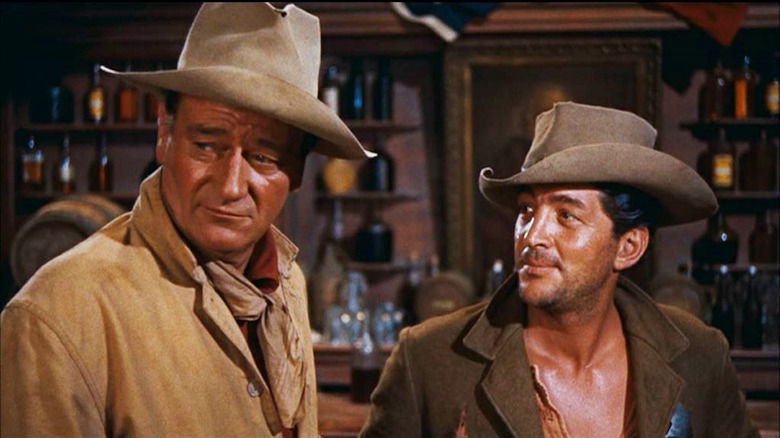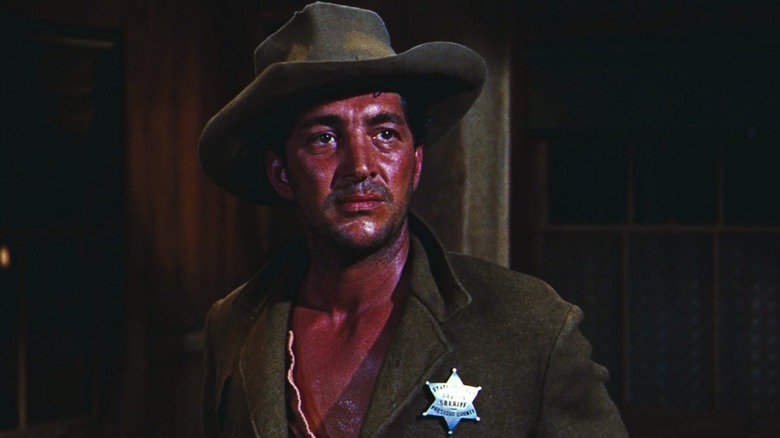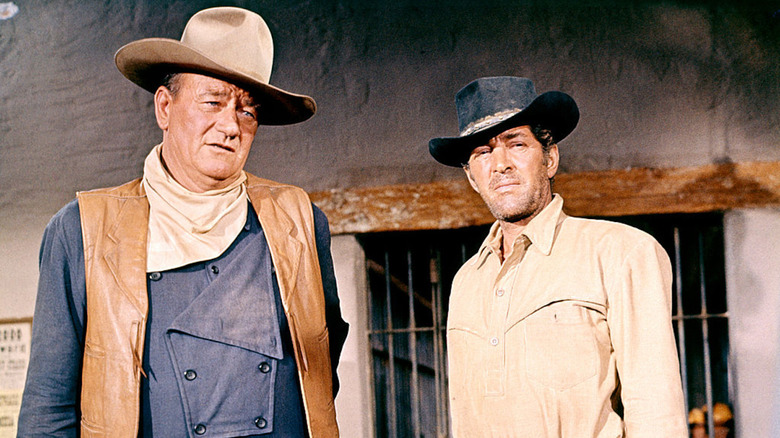Dean Martin's Rio Bravo Casting Was Worrying For John Wayne
Ask people to describe John Wayne, and you're most likely to hear them talk about his larger-than-life swagger and taciturn nature. While it's wrong to say The Duke generally played himself in every film, he did adjust each character's dialogue and behavior to fit within his carefully crafted persona. Audiences filled theaters to see John Wayne be, to some recognizable degree, John Wayne, and he was a savvy enough entertainer to know that they didn't want to see him stretch (which he learned when he played Genghis Khan in the notorious stinker "The Conquerer").
Wayne was initially fine with this arrangement, but according to Scott Eyman's "John Wayne: The Life and Legend," as his career wore on, he began to grouse that he was "the hub of the wheel" around which an array of far more colorful characters spun for our enjoyment. Moviegoers might've loved his steadiness, but he was an actor as well as a star, and he wanted something interesting to do when he showed up for work every day. Wayne expressed this concern to Howard Hawks prior to the making of "Rio Bravo," and he learned a valuable lesson in the process.
Dino and The Duke
Dean Martin was a massive star in his own right when "Rio Bravo" went before cameras in 1958. The Steubenville, Ohio native was a chart-topping crooner and Frank Sinatra's elbow-tipping foil in the Rat Pack. He carried himself with a preternatural, casually sophisticated cool. He was urbane, which meant the "Rio Bravo" role of Dude, a once respected deputy who's turned into an unemployable drunk, wasn't entirely wheelhouse material for him. He also had a fascinating, clearly defined arc, whereas Wayne's Sheriff John T. Chance was an unwavering man of action.
Per Eyman's biography, "John Wayne: The Life and Legend," Wayne told Hawks he was worried he'd be overshadowed. Hawks had the perfect response. From the book:
"After Martin was cast, Wayne began to think seriously about his character. 'Martin gets all the fireworks, doesn't he?' he asked Hawks, who had to agree. 'What do I do?' he finally asked.
'What would happen to you if your best friend had been a drunk and he was trying to come back – wouldn't you watch him?' asked Hawks. Wayne knew all about working with drunks; he thought about it, nodded and said, 'OK, I know what to do.'"
A life-saving friendship
The relationship between Chance and Dude is the most endearing quality of "Rio Bravo," which is saying a lot, because it's one of the most endearing Westerns ever made. At the outset, Chance is disgusted by Dude's pathetic attempt to retrieve a coin from a saloon spittoon, which prompts Dude to cold-cock him. This violent interaction speaks volumes to their relationship. Dude knows what he's become, and, we soon realize, is riddled with shame. He's also probably heard plenty from his friend on the matter, which is why he lashes out with his fists.
But when the chips are down, and Chance finds himself outnumbered by Nathan Burdette's pack of vicious gunmen, Dude sobers up and returns to his former quick-draw form. Wayne's tough-love performance is the key to the film's greatness. He never gave up on Dude, and his doggedness on the matter saves both of their lives. There isn't a better film about friendship.


